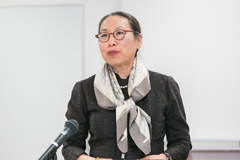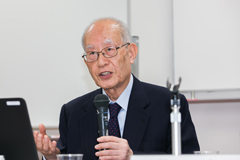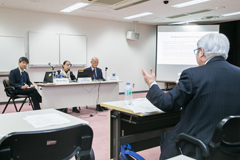Discussing the Normative Framework of Japan’s Bilateral Development Cooperation With Distinguished Fellow Sakiko Fukuda-Parr
2017.01.26
The rise of emerging donors is changing the landscape of development cooperation and posing challenges to the donors of the OECD Development Assistance Committee (DAC). In this background, an open seminar was held at the JICA Ichigaya Building in Tokyo on January 17, to explore alternative normative frameworks of development cooperation. Speakers included Sakiko Fukuda-Parr, distinguished fellow at JICA Research Institute (JICA-RI) and professor at The New School, U.S, and Hiroaki Shiga, senior research fellow at JICA-RI, who jointly wrote a JICA-RI working paper focusing on the norms of Japanese bilateral aid in comparison with those of the DAC and Southern donors.

Sakiko Fukuda-Parr, JICA-RI distinguished fellow
Naohiro Kitano, director of JICA-RI, made the opening remarks, followed by presentations from Fukuda-Parr, Shiga, and Yasutami Shimomura, professor emeritus of Hosei University who reviewed the paper.
Fukuda-Parr explained that less attention has been paid to the roles of norms and the question of relationships created between donors and recipients. The paper thus focused on the norms that crucially guide policy priorities, instruments and relationships with recipients. Sharing the anthropological insights from gift theory that helps understand the behavior of bilateral aid donors and the nature of donor-recipient relationships, she remarked that hierarchical relationships established by giving gifts are neutralized if the recipients reciprocate, which goes outside the normative framework of DAC. She elaborated on the basic principles of the DAC norms that define aid as charity, contrasting them with the core normative principles of Japanese bilateral aid policy and Southern cooperation models that have a lot in common and are separate from the DAC framework, including an emphasizing on mutual benefits and respect for sovereignty in donor-recipient relationships.
Subsequently, Shiga discussed the Japanese cooperation model, focusing on the historical evolution of the Japanese normative framework. Emphasizing the meaning of the term “economic cooperation,” that defined Japanese aid as a joint effort among equals toward the same goal, he explained that the norms of the Japanese Official Development Assistance (ODA) were formed through an endeavor to present Japan as a peaceful nation and an equal partner for development in the post war recovery. Comparing Japanese ODA norms with DAC and Southern norms, he explained that Japan as an outlier has many commonalities with both DAC donors and emerging donors, though its aid norms are not completely identical.

Yasutami Shimomura, professor emeritus of Hosei University
Fukuda-Parr continued the presentation, sharing key controversies over South-South cooperation norms that overlap with DAC criticism of Japan. She closed her presentation by stressing how Japanese experiences in development aid are relevant to the international debates about the concept of aid while the DAC aid model is being questioned, referring to Japan’s historical role in the DAC.
Taking up Thomas Kuhn’s paradigm theory that the path to a paradigm change begins when significant exceptions to the prevailing theory are recognized as something that must be explained, Shimomura pointed out that the Japanese aid model can be an important “anomaly” to the prevailing “charity model” of North-South aid, which would lead the way to a new paradigm of development cooperation.
In the Q&A session, the relationship between Japan’s traditional respect for the sovereignty of the recipient and its commitment to the enhancement of democratic governance in the developing countries was discussed. Responding to the audience, Fukuda-Parr underlined that the scope of the paper is the provision of a historical analysis of Japanese normative framework, while agreeing that the priority of development cooperation is to support democratic values, and that the 2030 Agenda is a major enumeration of challenges to Japanese aid. Shimomura commented that development goals like poverty reduction and economic growth must be discussed separately from the commitment to universal values such as democracy or human rights, even though we fully recognize the importance of the universal values. Shiga argued that Japan can facilitate democratic governance by assisting democratic consolidation, without compromising the traditional norm of respecting the sovereignty and the ownership of the recipients.

Hiroaki Shiga, JICA-RI senior research fellow (left) has discussions with those in attendance
The seminar ended with closing remarks by Nobuko Kayashima, JICA-RI Deputy Director, expressing her gratitude for the discussion which was not only limited to the norm issues but also extended to values and philosophy
Seminar on the Normative Framework of Japan’s ODA by Sakiko Fukuda-Parr
(YouTube: JICA Research Institute Official Channel)

事業事前評価表(地球規模課題対応国際科学技術協力(SATREPS)).国際協力機構 地球環境部 . 防災第一チーム. 1.案件名.国 名: フィリピン共和国.

事業事前評価表(地球規模課題対応国際科学技術協力(SATREPS)).国際協力機構 地球環境部 . 防災第一チーム. 1.案件名.国 名: フィリピン共和国.

事業事前評価表(地球規模課題対応国際科学技術協力(SATREPS)).国際協力機構 地球環境部 . 防災第一チーム. 1.案件名.国 名: フィリピン共和国.

事業事前評価表(地球規模課題対応国際科学技術協力(SATREPS)).国際協力機構 地球環境部 . 防災第一チーム. 1.案件名.国 名: フィリピン共和国.

事業事前評価表(地球規模課題対応国際科学技術協力(SATREPS)).国際協力機構 地球環境部 . 防災第一チーム. 1.案件名.国 名: フィリピン共和国.
scroll